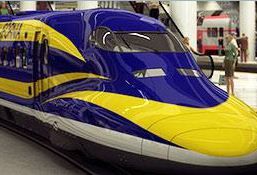Did fear of political Waterloo spur bullet-train switch?
 Earlier this month, in one of the biggest changes in the history of the state’s bullet-train project, California High-Speed Rail Authority officials announced they had changed their mind on where the first segment of the now-$64 billion project would be built. Instead of linking the Central Valley to the San Fernando Valley, authority officials said it would link Silicon Valley and the Central Valley.
Earlier this month, in one of the biggest changes in the history of the state’s bullet-train project, California High-Speed Rail Authority officials announced they had changed their mind on where the first segment of the now-$64 billion project would be built. Instead of linking the Central Valley to the San Fernando Valley, authority officials said it would link Silicon Valley and the Central Valley.
Rail authority board chairman Dan Richard described the change in plans as being driven by practicality: Having the first segment go from Kern County to San Jose instead of Fresno to Burbank allows the authority more certainty in being able to complete an initial segment. The old plan was for a difficult, partly mountainous 300-mile route costing $31 billion. The new plan is for a flat 250-mile route costing about $20 billion.
This allows for “a transition from planning and initial construction to being able to stand up and say we have federal funding, bond money, cap-and-trade revenue, and that those funds are sufficient for us to build, open and operate the first real high-speed rail leg in California,” Richard said at the news conference announcing the changes.
L.A.-area route risked mass political defections
But there is also evidence that the rail authority feared that if it continued with the original plan, it would face a political Waterloo. The state project had already lost the crucial support of some Los Angeles-area politicians and risked losing far more — starting with state Senate President Kevin de Leon and Assembly Speaker Anthony Rendon.
In 2014 and 2015, throughout the San Fernando Valley, grass-roots opposition to the state’s planned route built steadily. Some Latino activists said the bullet train’s effects would be so harsh on working-class minority communities that it should be a civil rights issue because the train and its 20-foot-high sound wall would bisect the San Fernando Valley in a way that would disrupt traffic, business patterns, schools, transit and everyday life.
At a May 2015 town-hall meeting, rail authority officials heard impassioned pleas to take their project elsewhere.
“Our community’s history has been riddled with displacement. My family has all its roots here. I want my grandchildren to grow up here, understanding how great a place it is. We like where we live,” testified San Fernando resident Genaro Ayala, according to a Los Angeles Times report.
But at that meeting, Richard downplayed the impacts to the crowd. Lou Correa, a veteran Democratic politician from Orange County appointed to the rail authority board in March 2015, said he detected “NIMBYism” in the complaints. That sparked a furious response from local residents, who said that rich communities used similar tactics to block projects they didn’t like, and that it was outrageous for anyone to suggest opposition was reflexive instead of driven by concern about impacts on their neighborhoods.
This public anger has translated into political support. As CalWatchdog reported last year, many public officials have been sharply critical of much or all of the project. The most prominent initial opponents included Rep. Adam Schiff, D-Burbank, and Rep. Judy Chu, D-El Monte, Los Angeles County Supervisor Michael Antonovich, who represents much of the affected part of the county, and San Fernando Mayor Pro Tem Sylvia Ballin and Councilman Jaime Soto. Now the list also includes elected leaders from Sylmar, Santa Clarita, Shadow Hills, Lakeview Terrace and other Valley communities. In December, Assemblywoman Patty Lopez, D-San Fernando, dropped her official support.
Did Rep. Schiff pressure Obama administration?
Schiff is the heavy hitter of the crowd because of his willingness to use his good relationship with the Obama administration to pressure the federal government, the state government’s de facto partner in the high-speed rail project because of $3 billion-plus provided in federal funds and because of the many federal regulatory approvals still needed.
A year ago, for example, he made headlines in the San Fernando and San Gabriel Valleys when he ripped the National Parks Service for delays in completing promised studies involving the Angeles National Forest. That led the Save Angeles Forest for Everyone group, known as SAFE, to urge Schiff to pressure federal officials to seek changes in the bullet-train route, starting with plans for a mountain tunnel.
It’s not known what, if anything, the veteran Democrat did. But the California High Speed Rail Blog, home to the project’s most ardent defenders, expressed deep concern in January 2015 that Schiff’s opposition to the state’s plans “is going to make it very difficult for such a tunnel to be built. Other Democrats in the state’s congressional delegation will likely defer to Schiff on this, leaving the CHSRA with even fewer allies for a tunnel in the unlikely event they chose that alternative.”
However it came to pass, Schiff got his way, and, for now, his district is safe from disruption.
Chris Reed
Chris Reed is a regular contributor to Cal Watchdog. Reed is an editorial writer for U-T San Diego. Before joining the U-T in July 2005, he was the opinion-page columns editor and wrote the featured weekly Unspin column for The Orange County Register. Reed was on the national board of the Association of Opinion Page Editors from 2003-2005. From 2000 to 2005, Reed made more than 100 appearances as a featured news analyst on Los Angeles-area National Public Radio affiliate KPCC-FM. From 1990 to 1998, Reed was an editor, metro columnist and film critic at the Inland Valley Daily Bulletin in Ontario. Reed has a political science degree from the University of Hawaii (Hilo campus), where he edited the student newspaper, the Vulcan News, his senior year. He is on Twitter: @chrisreed99.
Related Articles
CA’s Bond Rating Equals F-Minus Grade
APRIL 21, 2011 By WAYNE LUSVARDI Why is there such a large discrepancy between California State Treasurer Bill Lockyer’s assurances
California politicians react to GOP tax plan
House Republicans unveiled a massive tax overhaul last week which would disproportionately affect California taxpayers. The GOP proposal would halve
Secretary of State's Website Crashes
Anthony Pignataro: 8:32 p.m. — The California Secretary of State’s office is a quiet place right now, mostly because the



